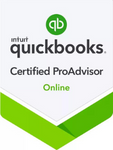Managing inventory effectively is crucial for the success of any ecommerce business. Making mistakes in your forecasting, counting or tracking can lead to inadequate stocks, unnecessary purchases and shipment delays. Inventory management tools are therefore very important for any business that wants to satisfy its customers and stay ahead of the competition.
So, What Is Inventory Management?
Inventory management is basically the process of tracking the amount, product mix, location and pricing of the inventory of a business. This helps businesses easily identify which products are in stock, overstocked, understocked or totally out of stock and adjust their operations accordingly.
By implementing good strategies and using the right inventory management apps, you will streamline processes and give your customers a pleasant buying experience.

Common Inventory Management Strategies
Since each business has unique needs, there is no one-size-fits-all solution for ecommerce inventory management. Here are some of the inventory management techniques you might want to consider for your business:
1. First In, First Out (FIFO)
First in, first out (FIFO) is a technique commonly used by businesses selling perishable items. It means that the first goods to arrive at the warehouse are the first to be shipped out to customers. The benefits of FIFO include less wastage and optimized warehouse circulation.
The bigger your business grows the more this issue becomes prevalent. You might find that your suppliers have the same issues managing their warehouses against your and other sellers orders. Some ecommerce stores even use drop shipping, a system whereby the order is fulfilled directly by the supplier. In drop shipping you lose complete control of your ecommerce order management as you rely on the supplier to ensure the delivery is completed.

2. Dropshipping
Dropshipping is the most unique inventory management strategy. When a customer places an order, the business owner fulfills it from the manufacturer and then sends it directly to the customer. This means that you never touch the merchandise. Dropshipping is the best technique for ecommerce business owners that want to avoid the cost of storage space or a warehouse. The downside is higher fulfillment costs and a complete lack of quality control.
3. Just-In-Time Inventory
The just-in-time inventory (JIT) strategy is used by businesses that only stock a product whenever a customer orders it. This is especially ideal for companies that sell seasonal goods. When the season is over, they don’t have to worry about lost revenue tied up in dead stocks.
4. Safety Stock
Safety stock is a strategy that involves holding extra inventory to cover any unexpected increases in demand. This helps you sustain consistent output and prevent delays.
5. 3PL Fulfillment
Third-party logistics (3PL) is where a business handles ecommerce logistics on behalf of other businesses. For a fee, 3PL companies will handle logistics for clients including warehousing, inventory management and fulfillment. This strategy allows you to have more time to focus on high-level tasks.

How To Choose The Right Inventory Management Software
With the numerous ecommerce inventory management tools in the market, selecting the right one for your business can be a challenge. Here are some factors to consider when making your choice.
1. Features
Your business needs and challenges will determine the exact features you require to operate effectively. Some of the important inventory management app features to look out for include real-time inventory tracking, purchase management, batch tracking, bills of material management, serial number tracking and barcode scanning.
2. Usability
Ease of use is another important consideration when choosing inventory management software. If it will take lots of hours for your employees to learn how it works, it is probably not a good choice for your business. Find a solution that will simplify your processes, thus saving you energy, money and time.
3. Cost Of The Software
The price of the app will be determined by the complexity of your requirements. If you have a limited budget, you might only be able to afford a functional system with limited features right now. However, make sure the app comes with the ability to upgrade later as your business grows.
4. Integration With Other Systems
You are probably using several management systems to run your business. This could be purchasing systems, accounting software or warehouse management tools. Therefore, choosing inventory management software that easily integrates with your existing systems is advisable. This will streamline your supply chain and save you lots of money and time.
5. Customer Support
Quality customer support is critical for your success with inventory management software. Be sure to choose a vendor who will offer accessible and professional support, including warranty, training and 24/7 help.
Best Free And Paid Ecommerce Inventory Management Apps
In this review of inventory management tools, we will explore 5 apps and their main features, prices, integrations and demo/free trial details. This will make it easier for you to select the best software for your business needs.
1. Fishbowl
Fishbowl is both a manufacturing and warehouse inventory management tool. Designed for companies that use Quickbooks, it is used by NASA, the U.S. Army, Mercedes-Benz and General Electric. Its standout features include automatic reorder points and inventory control. The app can also forecast inventory requirements and enable stock transfer between warehouses.
Fishbowl integrates with ecommerce platforms and software applications including eBay, Salesforce, Amazon, HubSpot, Quickbooks, Zencart, Magento and Clover Connect.
Interested users can receive a custom quote upon request. Fishbowl also offers a free demo.
Pros
- Hybrid: Users can manage warehousing, manufacturing and inventory on one single platform
- Multiple integrations: Fishbowl integrates with 50+ third-party tools
- Training: Users receive personalized training via video calls or on location
Cons
- User interface: Unlike other inventory management tools, Fishbowl’s user interface is not very easy to navigate
- Scheduling: The app is unable to schedule materials planning automatically
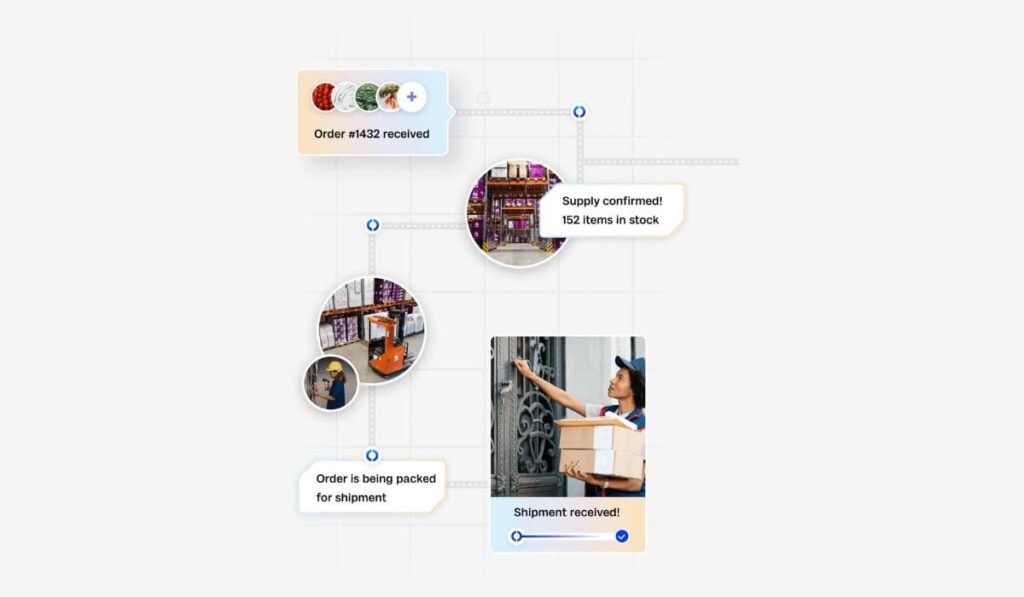
2. Zoho Inventory
Zoho inventory helps businesses manage purchase and sales orders while offering reliable product tracking. In addition, it supports inventory control tasks, warehousing processes and multichannel selling. With a free plan that allows up to 50 orders per month, this app is the ideal choice for small to mid-size businesses.
Zoho inventory comes with a wide range of features including item kitting, multi-warehouse management, serial and batch tracking and barcode scanning. It integrates natively with numerous PoS systems and ecommerce platforms including Magento, Shopify, BigCommerce and Etsy. The mobile app is accessible on both iOS and Android devices.
Pros
- User-friendly: The app is intuitive and easy to navigate
- Affordable: With paid plans starting from $39 per month, Zoho inventory is a very pocket-friendly solution
- Great customer support: Reviews reveal that customer support is fast and effective
Cons
- Bugs and glitches: According to reviews, some users have encountered bugs and glitches
- Delivery notes: The app cannot print delivery notes
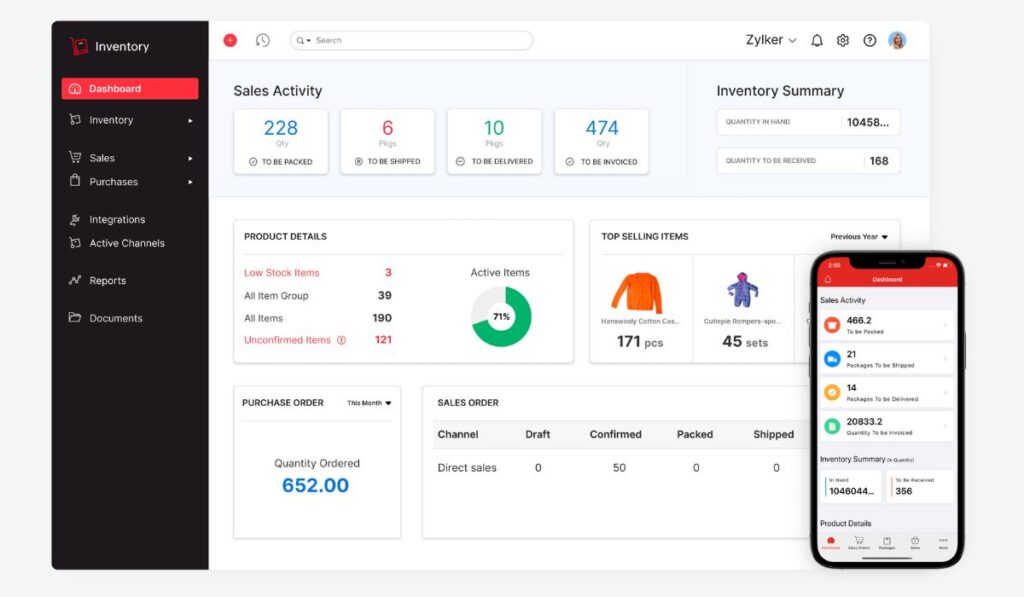
3. inFlow
Unlike other inventory management tools, inFlow is available both on-premise and in the cloud. Just like Zoho, it is built for small to medium-sized businesses. inFlow boasts a wide range of features including reordering, barcoding, assembly cost tracking, detailed reporting and a B2B portal.
inFlow integrates with ecommerce tools and marketplaces including SquareSpace, EasyPost, Zapier, Woocommerce, Amazon and Xero. Plans start at $89 per month and come with a 14-day free trial.
Pros
- User-friendly interface: It is very easy to learn and use
- Customer support: Client issues are resolved fast by helpful support staff
- Comprehensive features: The app comes with a wide range of comprehensive capabilities
Cons
- Multi-warehouse use: inFlow is unable to handle multiple storage locations effectively
- Integrations and API access: The tool offers no API access and limited integrations with third-party apps
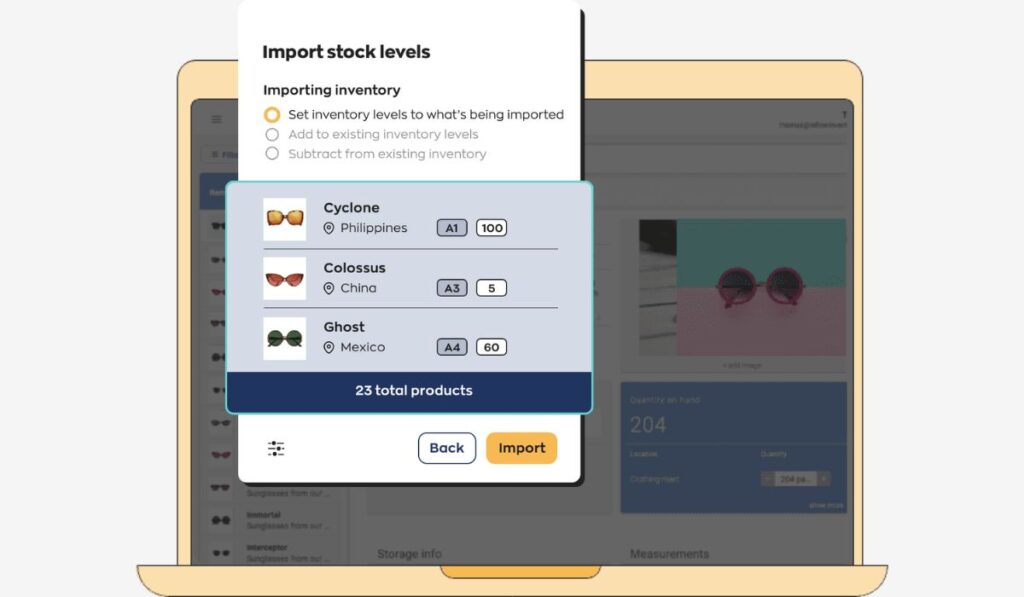
4. Odoo
Odoo is an open-source inventory management tool that is suitable for small as well as large businesses. Users get access to features such as custom alerts, barcode scanning, smart scheduling, serial number tracking, perpetual inventory valuation and dropshipping.
Odoo is available both as a self-hosted solution and SaaS. It integrates with ecommerce systems and CRM tools like Amazon, Magento, Shopify, HubSpot and Salesforce.
Pros
- Inventory forecasting: Customers can use purchase order, manufacturing orders and sales order to forecast product availability
- Affordable: Paid plans start from $24.90 per month
- Inventory adjustments: Odoo can make fast inventory adjustments based on box, pallet, lot or zone
Cons
- Extra costs: Ecommerce tools and point-of-sale cost extra
- Fixed adjustments: Users cannot revise or redo adjustments once they’re made
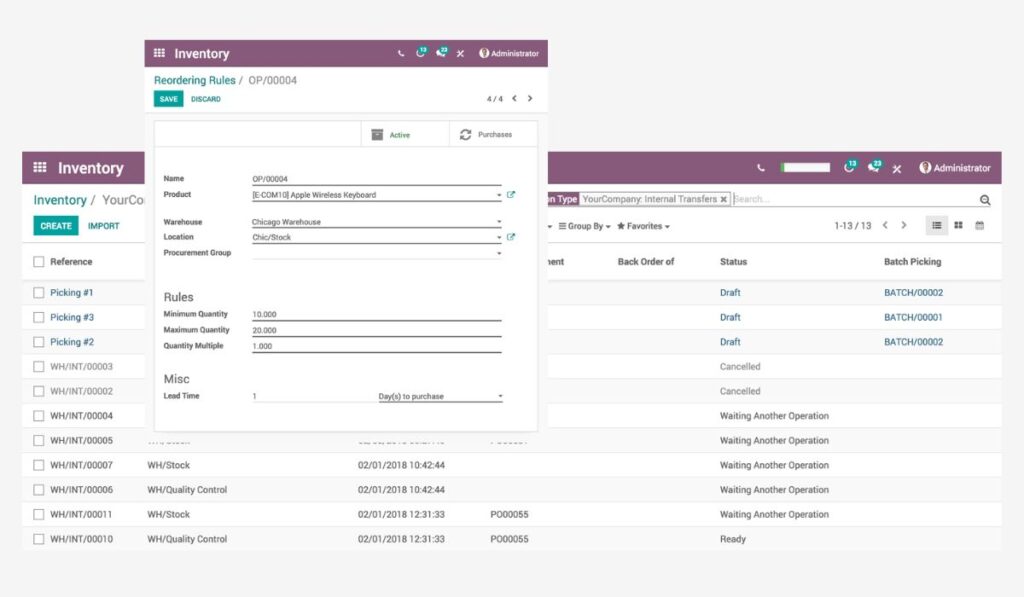
5. Sortly
A cloud-based inventory management software, Sortly is designed for the small business market. Just like other inventory management tools, it comes with features such as activity tracking, barcoding, customizable access profiles, location tracking and audit trails. Users can upload item photos, add tags or notes to items, print customizable QR labels and search and track products.
Paid plans start from $29 per month and come with a 14-day free trial period.
Pros
- Intuitive interface: Users require little or no training to get around
- Mobile apps: Sortly is accessible by iOS and Android users
- Freemium plan: Designed for new businesses and individuals, the freemium plan gives users up to 100 entries
Cons
- Kitting: The app doesn’t come with kitting capabilities
- Stock alert: Low stock alert is not accessible to freemium users
- Integration: Currently, the app has zero integration capability

Conclusion
Inventory management tools come in very handy for helping businesses improve their operational efficiency by automating their processes. This prevents problems such as having too much stock, not having enough stock and even having stock in the wrong place. Be sure to choose an inventory management strategy and tool that suits your business needs.
if you need a bookkeeper to help you manage your ecommerce inventory, take a look at our bookkeeping services for ecomm store owners.





